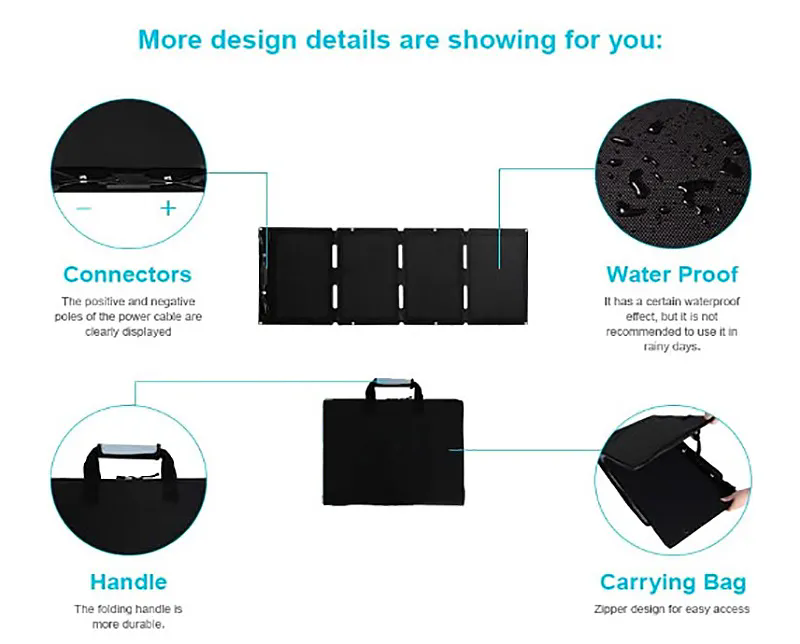Solar Panels for RV A Complete Guide to Off-Grid Freedom
2024-10-18
Traveling in an RV offers the ultimate freedom, but relying on campgrounds for electrical hookups can be limiting. That’s where solar panels for RVs come into play. With solar power, you can enjoy off-grid adventures without worrying about running out of energy. In this guide, we’ll cover everything you need to know about RV solar systems, including benefits, types, components, installation tips, and maintenance.
Why Solar Panels for RVs Are a Game-Changer
Solar power gives RVers more independence. Here are the key reasons why installing solar panels is worth it:
1. Energy Independence
- No need to rely on campground power.
- Power your RV even in remote locations.
2. Cost Savings
- Reduce or eliminate campground hookup fees.
- Solar systems pay off in the long run by reducing generator fuel costs.
3. Eco-Friendly
- Solar energy is clean and renewable, helping reduce your carbon footprint.
- Silent operation compared to noisy generators.
4. Low Maintenance
- Solar panels have few moving parts and can last 20+ years with minimal upkeep.
Types of RV Solar Panels
There are three main types of solar panels suitable for RVs:
1. Monocrystalline Panels
- Efficiency: High (18-22%)
- Lifespan: 25 years or more
- Best For: Limited roof space
- Cost: Higher than other types
2. Polycrystalline Panels
- Efficiency: Medium (15-18%)
- Lifespan: 20-25 years
- Best For: Budget-conscious RVers
- Cost: Lower than monocrystalline
3. Flexible or Thin-Film Panels
- Efficiency: Low to medium (10-15%)
- Lifespan: Around 10 years
- Best For: Curved RV roofs or temporary setups
- Cost: Generally cheaper
Essential Components of an RV Solar System
In addition to the solar panels themselves, you’ll need a few other components to complete your system:
1. Solar Charge Controller
- Regulates the power coming from the solar panels to protect your battery.
- Types: PWM (Pulse Width Modulation) and MPPT (Maximum Power Point Tracking).
- MPPT controllers are more efficient, especially with higher voltages.
2. Batteries
- Store the solar energy for later use.
- Options: Lead-acid, AGM, or Lithium-ion batteries. Lithium batteries are lighter, last longer, and are more efficient.
3. Inverter
- Converts DC (battery power) to AC (for appliances like TVs, microwaves, and laptops).
- Choose between pure sine wave (better for sensitive electronics) or modified sine wave inverters.
4. Wiring & Mounting Hardware
- Ensure proper connections and secure mounting of the panels on the RV roof.
How to Calculate the Solar Power You Need
Before buying a system, it’s crucial to determine your energy needs. Follow these steps:
1. Estimate Your Daily Power Consumption
- List all the devices you use and their wattage (e.g., fridge, lights, phone chargers).
- Calculate the total watt-hours (Wh) needed per day.
2. Determine the Battery Capacity Required
- Choose a battery bank that can store at least 1.5x your daily power consumption.
3. Select the Right Solar Panel Size
- Divide your daily Wh needs by the average sunlight hours (typically 5-6 hours).
- Example: If you need 1200Wh/day and get 5 hours of sun, you’ll need 240W of solar panels.
Installation Tips for RV Solar Panels
1. Roof Space Assessment
- Measure your roof space to ensure the panels fit. Consider air conditioners and vents that might block the installation area.
2. Angle and Orientation
- Mount the panels flat if your RV moves frequently, or use adjustable mounts to tilt them towards the sun.
3. Wiring and Safety
- Use high-quality cables and fuses to prevent voltage drops and ensure safety.
4. DIY vs. Professional Installation
- If you’re comfortable with electrical work, DIY installation can save money. Otherwise, hire a professional to ensure a safe and efficient setup.
Maintenance of RV Solar Panels
- Cleaning: Wipe off dust, leaves, and bird droppings regularly with water and a soft cloth.
- Inspection: Check for loose wiring, cracks, or any damage after long trips.
- Battery Care: Ensure batteries are not overcharged and maintain proper water levels if using lead-acid batteries.
Popular Solar Panel Kits for RVs
1. Renogy 200W 12V Solar Kit
- Ideal for beginners with basic energy needs.
- Includes panels, charge controller, cables, and mounting brackets.
2. Go Power! 300W Solar Extreme Kit
- Great for frequent travelers who need more power.
- Comes with an MPPT controller and inverter.
3. Zamp Solar 680W Deluxe Kit
- Premium option for full-time RVers.
- Features highly efficient monocrystalline panels and a pure sine wave inverter.
Conclusion: Enjoy Freedom with Solar Power for Your RV
Investing in solar panels for your RV offers unparalleled freedom and sustainability. Whether you want to camp off-grid, save money, or reduce your carbon footprint, a solar setup is the perfect solution. With proper planning, installation, and maintenance, your solar system will provide reliable energy for years to come.



